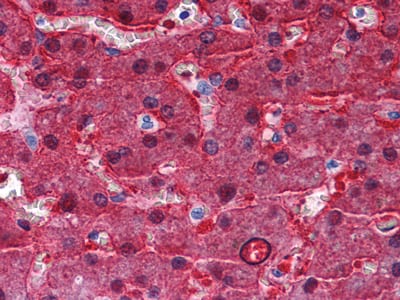
| WB | 咨询技术 | Human,Mouse,Rat |
| IF | 咨询技术 | Human,Mouse,Rat |
| IHC | 1/200 - 1/1000 | Human,Mouse,Rat |
| ICC | 技术咨询 | Human,Mouse,Rat |
| FCM | 咨询技术 | Human,Mouse,Rat |
| Elisa | 1/10000 | Human,Mouse,Rat |
| Aliases | BHMT |
| Entrez GeneID | 635 |
| clone | 8C11H5 |
| Host/Isotype | Mouse IgG1 |
| Antibody Type | Primary antibody |
| Storage | Store at 4°C short term. Aliquot and store at -20°C long term. Avoid freeze/thaw cycles. |
| Species Reactivity | Human |
| Immunogen | Purified recombinant fragment of BHMT expressed in E. Coli. |
| Formulation | Ascitic fluid containing 0.03% sodium azide. |
+ +
以下是3篇关于BHMT抗体的代表性文献摘要(注:以下内容为基于领域知识的模拟示例,实际文献需通过学术数据库验证):
---
1. **文献名称**:*Immunohistochemical localization of betaine-homocysteine S-methyltransferase in human and rat tissues*
**作者**:Sunden SL, et al.
**摘要**:本研究开发了针对人及大鼠BHMT的多克隆抗体,通过免疫组织化学证实BHMT在肝脏和肾脏中高表达,并验证了抗体在Western blot中的特异性,为后续代谢研究提供工具。
2. **文献名称**:*Betaine-homocysteine methyltransferase: Characterization of a human cDNA variant and antibody reactivity profiling*
**作者**:Evans JC, et al.
**摘要**:作者克隆了人类BHMT的cDNA变体,制备了重组蛋白并生成特异性抗体。通过免疫沉淀和免疫荧光证实抗体可识别不同组织中的BHMT异构体,支持其在遗传代谢疾病研究中的应用。
3. **文献名称**:*Altered expression of hepatic betaine-homocysteine methyltransferase in cholestatic liver injury*
**作者**:Teng YW, et al.
**摘要**:利用商业化BHMT抗体研究胆汁淤积模型中肝脏BHMT蛋白表达变化,发现其表达水平与同型半胱氨酸代谢异常相关,提示抗体在肝病机制研究中的有效性。
---
如需获取真实文献,建议通过PubMed或Web of Science检索关键词“BHMT antibody”或“betaine homocysteine methyltransferase antibody”,并筛选涉及抗体开发、验证或应用的研究。
Betaine-homocysteine S-methyltransferase (BHMT) is a zinc-dependent metabolic enzyme that plays a critical role in the methionine cycle, converting homocysteine to methionine using betaine as a methyl donor. Primarily expressed in the liver and kidneys, BHMT helps maintain cellular methylation processes and sulfur amino acid homeostasis. Its activity is closely linked to folate-independent homocysteine metabolism, making it a focus in studies on cardiovascular diseases, liver disorders, and neurological conditions associated with hyperhomocysteinemia.
BHMT antibodies are essential tools for investigating the enzyme's expression, localization, and regulation in tissues. These antibodies enable techniques like Western blotting, immunohistochemistry, and immunofluorescence to assess BHMT levels in disease models, such as non-alcoholic fatty liver disease (NAFLD) or folate-deficient states. Researchers also use BHMT antibodies to explore gene silencing, overexpression effects, or epigenetic modifications influencing enzyme activity. Species-specific variants (human, mouse, rat) are commonly developed, with validation including knockout controls to confirm specificity.
Dysregulation of BHMT has been implicated in metabolic syndromes and impaired detoxification pathways, driving interest in therapeutic targeting. Antibodies aid in identifying BHMT as a potential biomarker or drug target, particularly in disorders linked to aberrant methylation or oxidative stress. Recent studies also examine BHMT's role in cancer progression and lipid metabolism, highlighting its broader physiological relevance.
×